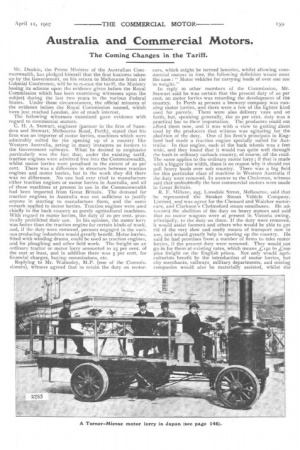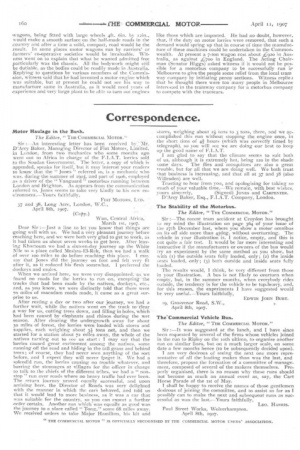Australia and Commercial Motors.
Page 29

Page 30

If you've noticed an error in this article please click here to report it so we can fix it.
The Coming Changes in the Tariff.
Mr. Deakin, the Prime Minister of the Australian Corn. monwealth, has pledged himself that the first business taken up by the Government, on his return to Melbourne from the Colonial Conference, will be to re-cast the tariff, the Ministry basing its scheme upon the evidence given before the Royal Commission which has been examining witnesses upon the subject during the last two years in the various Federal States.. Under these circumstances, the official minutes of the evidence before the Royal Commission named, which have just reached London, are of much interest.
The following witnesses examined gave evidence with regard to commercial motors.
C. H. A. Stewart, engineer (partner in the firm of Saunders and Stewart, Melbourne Road, Perth), stated that his firm was an importer of motor lorries, machines which were admirably suited for the opening up of a country like Western Australia, acting in many instances as feeders to the Government railways. What he desired to emphasise particularly was the fact that, under the existing tariff, traction engines were admitted free into the Commonwealth, whilst motor lorries were penalised to the extent of 20 per cent. There was a difference in structure between traction engines and motor lorries, but in the work they did there was no difference. No one had ever tried to manufacture either traction engines or motor lorries in Australia, and all of these machines at present in use in the Commonwealth had been imported from Great Britain. The demand for traction engines in Australia was not sufficient to justify anyone in starting to manufacture them, and the same remark applied to motor lorries. Traction engines were used chiefly in the back country as purely agricultural machines. With regard to motor lorries, the duty of 20 per cent. practically prohibited their use. In his opinion, the motor lorry was better than the traction engine for certain kinds of work, and, if the duty were removed, persons engaged in the various producing industries would greatly benefit. Motor lorries, fitted with winding drums, could be used as traction engines, and for ploughing and other field work. The freight on an ordinary tractor or motor lorry amounted to 25 per cent, of the cost at least, and in addition there was 5 per cent, for financial charges, buying commissions, etc.
Replying to Mr. Walmsley, M.P. (one of the Commissioners), witness agreed that to retain the duty on motor
cars, which might be termed luxuries, whilst allowing commercial motors in free, the following definition would meet the case : " Motor vehicles for carrying loads of over one ton in weight."
In reply to other members of the Commission, Mr, Stewart said he was certain that the present duty of 20 per cent. on motor lorries was retarding the development of the country. In Perth at present a brewery company was running motor lorries, and there were a few of the lighter kind used for parcels. There were also delivery vans and so forth, but, speaking generally, the 20 per cent. duty was a practical bar to their importation. The producers could not afford them now, and it was with a view to getting „them used by the producers that witness was agitating for the abolition of the duty. One of his firm's principals in England had made a traction engine specially suited for Australia:• In that engine, each of the back wheels was 2 feet wide, and they found that it would run quite well through the bush in ordinary outback country, of course, off the road. The same applies to the ordinary motor lorry; if that is made with a bigger tire width, there is no reason why it should not pull heavy loads over soft country. There was a big field for this particular class of machine in Western Australia if the duty were removed. In answer to the Chairman, witness said that undoubtedly the best commercial motors were made in Great Britain.
R. F. Mi(lane, 295, Lansdale Street, Melbourne, said that he represented the Straker Steam Vehicle Company, Limited and was agent for the Chenard and Walcker motorcars', and Clarkson's Chelmsford steam omnibuses. He advocated the abolition of the duty on heavy motors and said that no motor wagons were at present in Victoria owing, principally, to the duty on them. If the duty were removed, it would assist farmers and others who would be able to get rid of the very slow and costly means of transport now in use, and would greatly help in opening up the country. He said he had promises from a number of firms to take motor lorries, if the present duty were removed. They would not go in for them at existing rates, which means 4.15o to .4.200 plus freight on the English prices. Not only would agriculturists benefit by the introduction of motor lorries, but city merchants, railways military departments, and mining companies would also be materially assisted, whilst the 'wagons, being fitted with large wheels 4ft. bin. by e2in., would make a smooth surface on the half-made roads in the .country and after a time a solid, compact, road would be the result. In some places motor wagons run by carriers or farmers' co-operative societies would be invaluable. Witness went on to explain that what he wanted admitted -free particularly was the chassis. All the bodywork might still be dutiable, as the bodies could be readily made in Australia. Replying to questions by various members of the Commis-sion, witness said that he had invented a motor engine which was suitable, but at present he could not see his way to manufacture same in Australia, as it would need years of .experience and very large plant to be able to turn out engines
like those which are imported. He had no doubt, however, that, if the duty on motor lorries were removed, that such a demand would spring up that in course of time the manufacture of these machines could be undertaken in the Commonwealth. At present a 7-ton wagon cost about ,920 in Australia, as against £700 in England. The Acting Chairman (Senator Higgs) asked witness if it would not be possible for a motorbus company to be successfully run ir Melbourne to give the people some relief from the local tram way company by initiating penny sections. Witness replied that he thought there were too many people in Melbourne interested in the tramway company for a motorbus company to compete with the tramcars.






























































